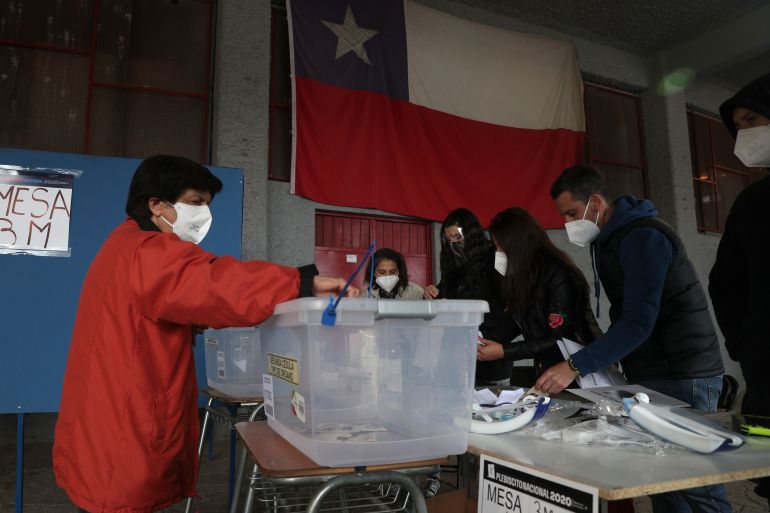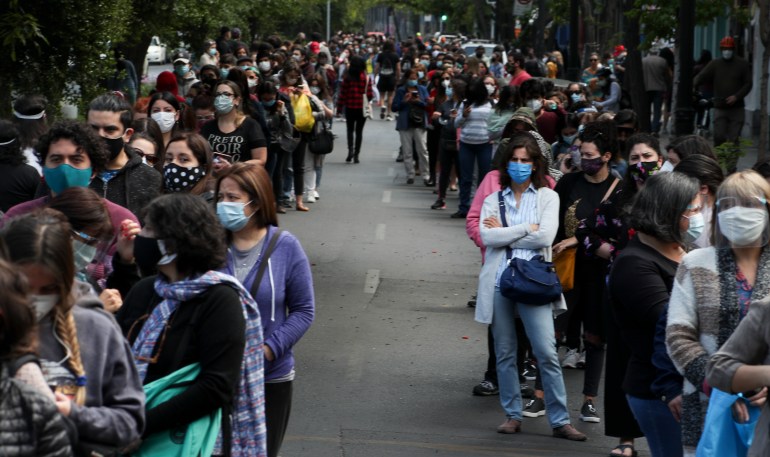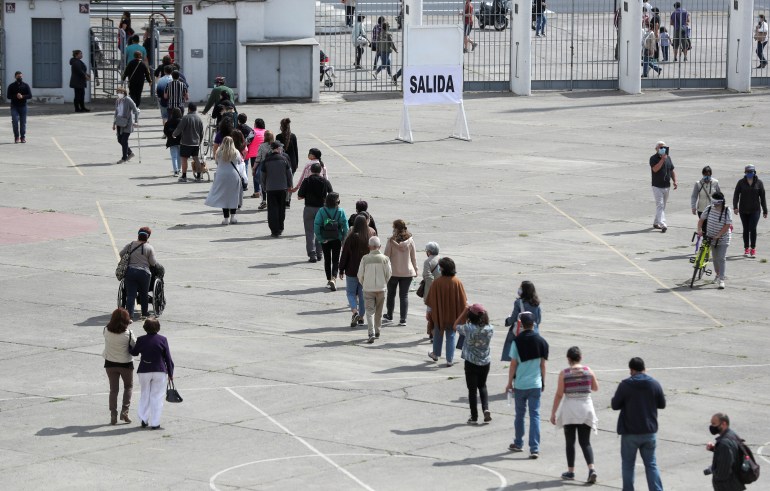Chileans vote in historic referendum on constitution
Voters cast ballots on whether to replace Pinochet-era constitution with new charter drafted by citizens.

Polls have opened in Chile for a referendum on whether the Pinochet-era constitution should be torn up and replaced by a fresh charter drafted by citizens, a key demand in protests that erupted last year.
Fierce anti-government demonstrations over inequality and elitism in one of Latin America’s most advanced economies broke out late last year and resumed as coronavirus lockdowns were eased.
Keep reading
list of 4 itemsTotal lockdown for Chile capital after surge in virus cases
How quarantined Chileans are keeping their protest movement alive
From dictatorship to now: Chilean women at forefront of protests
Voters have 12 hours beginning at 8am local time (11:00 GMT) to cast their ballots.
More than 14.8 million people are eligible to vote at 2,715 polling stations up and down the country, although COVID sufferers have been told to stay away on the threat of arrest. Chile surpassed 500,000 COVID-19 cases on Saturday, with nearly 14,000 deaths.

Chileans can decide whether to approve or reject a new constitution and whether it should be drafted by a specially elected citizens’ body, half of them women and half of them men, and Indigenous representatives, or a mix of citizens and legislators.
The winning camp needs a simple majority. Opinion polls have projected a new charter will be approved by a significant margin.
Pinera urges unity
Among the first of a slow trickle of voters was President Sebastian Pinera. His approval rating sank to an historic low during the protests and has remained in the doldrums throughout the pandemic.
Speaking from the upmarket suburb of Las Condes, close to his home, he urged Chileans to turn out in record numbers regardless of their voting inclination.
“Tonight when we know the results, let us respect the decision of the people and take strong and clear action for democracy and not for anarchy, for peace and not for violence, for unity and not for division,” Pinera told reporters.

Jose Antonio Kast, leader of the conservative Republican Party, told reporters as he exercised his vote that if turnout was high, the “reject” camp would win.
“What could have an impact is that people are afraid because of the pandemic. But we are hoping that won’t happen,” he said.
“I am full of hope that things will change and that we will bring a radical turnaround in this country,” Romina Nunez, 42, a poll organiser at the National Stadium in Santiago, the country’s biggest polling centre, told the AFP news agency.
More than 300,000 people are registered to vote at the stadium, which achieved infamy as a torture centre during Augusto Pinochet’s 1973-1990 rule.
“We have been waiting for much more than a year for this,” an emotional Elias Perez, a 39-year-old psychologist who wanted to be among the first to vote at the stadium, told AFP.

Bring your own pens
Soldiers, ubiquitous on Chile’s streets since the declaration of a state of emergency during the protests last year, and again with the outbreak of COVID-19 in March, will oversee the process inside polling stations, while police will guard outside.
Chileans must wear masks by law outside of their homes, and voters have been told to bring their own pens. Voting stations have been sprayed with cleaning solutions containing nano copper particles, an incorporation of the red metal that is Chile’s main export and which is said by scientists to be particularly inhospitable to the coronavirus.
The current constitution was drafted by Pinochet’s close adviser, Jaime Guzman in 1980, and has only been tweaked by successive governments to reduce military and executive power.